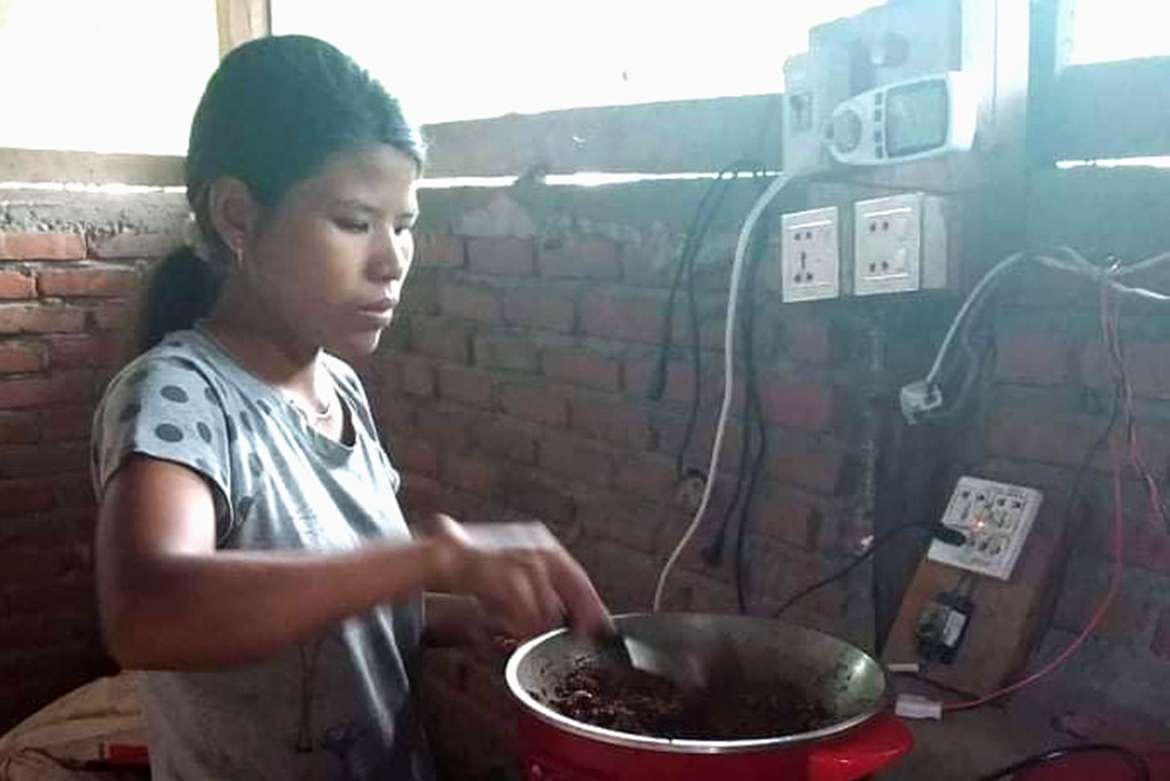
- Date
- 6th January 2022
- Categories
By Alexis Caujolle (Geres) and Richard Sieff (Loughborough University).
Do electric cooking appliances fit the local cooking culture and electricity supply in Myanmar? Are people willing to use and pay for electric cooking (eCooking)? What are the impacts of the adoption of eCook appliances on energy consumption and gender related issues over time? These are precisely the questions the MECS Electric Cooking Outreach (ECO) challenge fund seeks to address through community pilot studies.
Using the MECS Cooking Diaries approach, a recent MECS-ECO pilot project has shown how adopting a holistic approach can unlock unrealised potential for transitions to electric cooking. Focussing on 50 households in recently grid-connected villages in rural Thazi (Myanmar), the French NGO, Geres found the adoption of eCook appliances – particularly rice cookers, kettles, and electric frying pans (Figure 2) – to be rapid, significant, and long lasting.
The introduction of eCook appliances in phase 2 (month 2) led to cooking events with electricity more than doubling compared to the baseline phase 1 (month 1). People chose to cook with electricity throughout the 6 month pilot (Figure 1): in phase 4 (month 6), eCooking had increased further still to approximately two thirds of all cooking events, with sizeable reductions in the use of polluting firewood (50% decrease) and charcoal (almost completely abandoned) compared to the baseline. The effect on rice cooking was particularly noticeable, with 80% of rice cooking events now on electric rice cookers compared to less than 30% in the baseline phase. Geres project lead, Alexis Caujolle, stressed household preferences for electric cooking were clear: “people don’t want to go back to charcoal or firewood”.


eCooking was also compatible with cultural cooking practices as households did not change their menus after obtaining their appliances. Households highlighted eCooking was easier, cleaner, cheaper, and, above all, more convenient and saved time – the average time spent cooking per day decreased by more than 30 minutes (Figure 3). These benefits are particularly relevant to women who are the main cooks in Myanmar and disproportionately affected by the household air pollution, health impacts, and daily drudgery associated with cooking with firewood and charcoal.

While households clearly wanted to cook with electricity, lack of access (i.e. upfront cost and last mile availability) to quality eCook appliances was the main barrier to uptake in rural areas. Perceptions that eCooking is unsafe are also common due to a lack of information: over 50% of the participants held outdated perceptions that electricity is more dangerous than other cooking fuels.
Developing a women’s entrepreneurs’ network
To help address the challenges above and develop the clear opportunities for eCooking, ‘Ah Lin Tan’ – a social enterprise created via the Geres REACH project – supports and trains a last mile women entrepreneurs’ network to sell eCook appliances, with ECO project findings strengthening the network’s sector knowledge and marketing strategies. Ah Lin Tan faced challenges as Covid-19 and political unrest significantly affected sales. In addition, local appliance suppliers are affected by supply chain issues limiting their ability to offer the same products consistently, causing Ah Lin Tan and the entrepreneurs to have difficulties developing marketing and pricing strategies – which can lead to loss of trust from customers. Scale is likely to be key: more trained entrepreneurs may lead to more sales, opening up opportunities to buy products in larger quantities and/or import products or even brand them and become less dependent on local suppliers.
Product testing eCook appliances in the Myanmar market
To address the lack of quality control and increase consumer confidence within Myanmar, Geres pre-selected over 80 locally available eCook appliances and tested the most relevant ones (via energy efficiency tests, safety tests, and consumer focus groups) as part of the ECO study. This testing has then allowed Geres to select devices for field tests and sales. Price, design, brand, warranties, and above all, a preference for higher quality goods emerged from the consumer focus groups. Test results were detailed in two reports and incorporated into the MECS Myanmar eCookbook (Burmese). The product testing was also used to devise marketing strategies (channels, target clients, pitch and pricing) for each appliance type. This supported the key role of Ah Lin Tan in training female entrepreneurs to sell devices and find solutions like flexible payment facilities, and provided an evidence base to increase consumer confidence in eCooking.
Barriers to women’s entrepreneurship study
Complementing the pilot, a study on intervention strategies to remove barriers to women’s entrepreneurship was also conducted. Not feeling comfortable to travel and sell alone, lacking confidence to speak to strangers, domestic chores limiting time to network, and access issues to transportation to carry heavy/large products were the main barriers identified. The study noted emerging opportunities for female entrepreneurs from the expanding range of electrical appliances (including eCooking devices) which have enabled complimentary or larger devices (e.g. larger rice cookers) to be sold alongside more established product lines. Moreover, the study revealed a key opportunity for the entrepreneurs to add after sales service of electrical products as a value added proposition. Repair and maintenance is complicated in ‘last mile’ rural areas as without a certain level of sales, it is impossible to cover the logistics costs of logistics returning relatively inexpensive products to the supplier. Yet being locally based, the Ah Lin Tan trained entrepreneurs can help mitigate this issue by carrying out local repair or diagnostic advice of faulty appliances.
Next steps
By stimulating the beginnings of a supply chain and showing there is sustained demand for eCooking even in last mile locations, the research provides a critical evidence base enabling MECS to inform policy makers and investors on the clear opportunities to scale electric cooking in Myanmar.
For more information on the study, the Geres ECO final report is available on the MECS website.
Featured image, top: Recording energy usage data on eCook appliances – part of the Cooking Diaries approach (image credit: Geres, 2021).